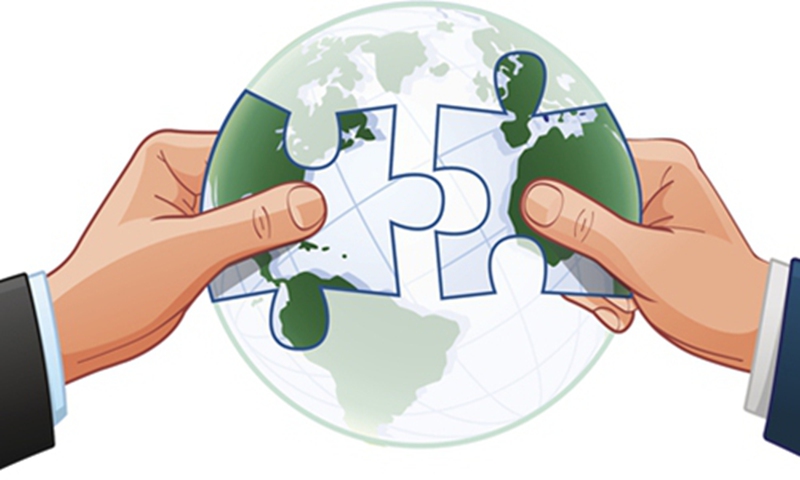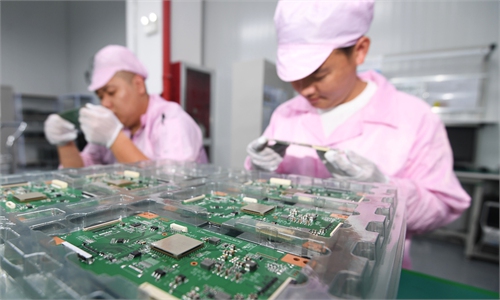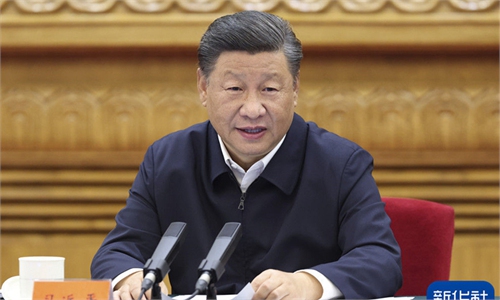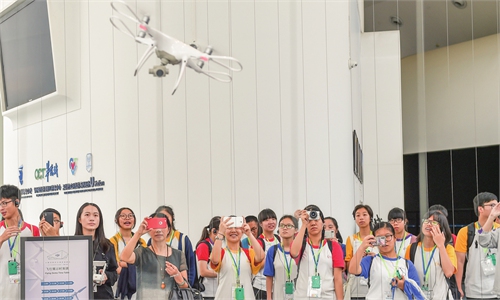
Photo: VCG
Editor's Note:"The West's size and comparative skills are not what they used to be 100 years ago. Asian nations, and particularly China, are out there for cooperation projects," said Professor Augusto Soto (Soto) of ESADE Business School in Barcelona, Spain. Soto is also the director of the "Dialogue with China" Project. He talked to the Global Times (GT) on the inclusiveness of the Communist Party of China and China's relations with Europe. Soto believes that China did not follow the path of the great powers vying for global domination. Instead, China transcends ideological differences that partially explain the country's economic successes.
GT: In recent years, the Western narrative about the Communist Party of China (CPC) has always avoided the positive points. Overall, there is neglect of the role of the CPC regarding China's progress and economic development. As a China expert, in your opinion, why can't the West objectively evaluate the CPC?
Soto: My views are based on 35 years of China watching in China and abroad, including four years learning and researching at the Beijing Language University and at the Peking University, also then serving at the Spanish News Agency in Beijing.
In fact, there is not a single uniform Western narrative concerning many subjects. Of course, there is a Western culture and a matrix of thought including a political system encompassing commonalities, and common traits in diplomacy. But this does not preclude some sharp differences among nations. Let's consider EU's divorce with London, called Brexit, and differences between some EU members concerning democratic values. Let's consider the very embarrassing and sour debate between France and Britain apropos immigrant rights in the Channel taking place right now in which one part is mentioning "blackmail" and "a violation of international maritime law." The quarrel has the potential to sharpen continental interstate cooperation in key dimensions of European integration: immigration, solidarity, and cohesion.
We should also have in mind differences between Trump-like minded potential presidential candidates in the US which might displace President Biden sooner than later. They could oppose many European characteristics and policies, more than during Trump administration. Worldviews are reconfiguring. It is not science fiction to assume that in its bowels the West is bound to produce more varied and distinctive narratives and inner collisions in the years ahead.
Regarding China, the West has acknowledged China's extraordinary positive social progress and its remarkable contribution to the world economic development.
Maybe it has not sufficiently linked it up to CPC's fundamental role in the sense that it has (with the key and extraordinary initiatives it has taken) unleashed the creative forces of the Chinese people. It is a gigantic accomplishment, configuring what former Singaporean Prime Minister Lew Kwan Yew defined as "the biggest player in the history of the world."
That lack of acknowledgement of CPC's key responsibility in China's modernization among part of Western politicians stems from the fact that among the current generation of leaders many grew up in times of the Cold War when the Soviet Communist Party was seen as a direct adversary. The West and the Soviet Union wanted to transform each other. But the CPC does not want to change foreign internal systems. To communicate this is a permanent challenge for Chinese media and Chinese diplomats.
GT: China's reform and opening-up policy is about being open to Western societies and institutions and learning from their strengths. It has given a huge boost to China's development. Do you think Western society can have such "liberation of mind" and take China's political system seriously?
Soto: When the West realized that China was embracing reform and opening-up policies since 1978 on, it read this process from the very beginnings in a Western fashion. It saw the emerging of a third world country; the more open to the West the better, and the more similar in trade and investment standards, the more potential to embrace Western democracy and values.
You could again see that view as China resumes exercise of sovereignty over Hong Kong in 1997. Analysts said that in the future Hong Kong, which was about to dramatically influence the Chinese mainland even though Hong Kong was only a successful former British colony.
A few years later, in 2001, when China joined the World Trade Organization, we witnessed a similar narrative. Namely, from now on, as China synchronizes standards with the rest of the world's economic order, China will unavoidably add more elements to "become like us."
All these diagnostics have proven wrong. China is a matrix civilization, I often remind my students, which is able to absorb influences, digest them, and come up with a new synthesis of its own. And equally and more importantly, it is a country coming up with its own contributions, for example, in terms of administration and governance. From a macro-historical perspective, we might correctly assume that in China's contemporary history the CPC plays the role of an unparalleled dynamo.
GT: In a recent article, you mentioned the limitation of the G7's plan for an infrastructure project to balance the Belt and Road Initiative's growing influence. Why is it easier for Chinese cooperation projects to get high-quality development?
Soto: We may say that the West has been taken aback by China's initiatives, most notably by the Belt and Road Initiative (BRI). Over the last years, in different round tables I have participated in Madrid, Barcelona, Brussels or Berlin, I heard that "China is opaque," and that the BRI harbors "hidden intentions," being a tool to bring development countries into "debt traps," and other superficial intentions. But there are also other voices in Europe saying that maybe we could cooperate. Just think of Italy, Greece and other EU counties which have signed BRI's Memorandum of Understanding (MOU), including countries which have not signed any MOU so far, like Spain, willing to deepen cooperation along the route. We should have in mind the tremendous significance of the Yiwu-Madrid train crisscrossing Eurasia and Madrid's will to deepen direct cooperation with China as well as in third markets such as Northern Africa and Latin America.
On the other side, you do not need to be a genius to realize that Biden's support for a G7's plan for an infrastructure project to balance the BRI's growing influence might turn out only to be wishful thinking. It is far from clear whether the G7 countries will have the will to rally behind such a project demanding colossal investment and profound coordination between governments and corporations. I just read a recent report quoted by The New York Times saying that the US lacks skilled workers to accomplish its own national $1 trillion infrastructure bill as a way to create millions of jobs.
No, EU nations have too much historical experience to "choose sides." To take a side unavoidably leads to confrontation. So, it is important for the EU not to play this card. For example, it is not realistic for the EU to align itself or rally behind the recent G7 and NATO worldwide views, including the "Indo-Pacific" notion. Anyway, those views were publicized before the dramatic collapse of the Afghan mission.
It not only does not make sense, but is unrealistic regarding size. Western size and comparative skills are not what they used to be 100 years ago. Asian nations, and particularly China, are out there for cooperation projects. And per se cooperation is a real condition for high-quality development. Shouldn't it be when our common concerns are more global than ever? You name it: climate change, global health concerns. Of course, competition is unavoidable (also among Western countries). But confrontation should be banished from our common language.
GT: The situation in Afghanistan has captured the world's attention. What do you think of US'20 years in Afghanistan? What does US' failure in Afghanistan mean for its European allies?
Soto: In the second week of September, the balance was as grim as on August 30. The Taliban's swift takeover of Afghanistan surprised the world and particularly shocked the US and Europe. Indeed, the aftershocks of Afghanistan's failure will last. Indeed, the transatlantic relationship is experiencing its lowest moment since its inception.
The episode of the fall of Kabul and the defeat in Afghanistan has highlighted the excessive strategic dependence of Europeans on the US. But of course, reducing it implies two things: very strong internal cohesion in the EU (an absent element), and more spending on defense, for which there is European unwillingness. Western military (and civil) overwhelming technological superiority has not stopped the Taliban from winning. This fact has tremendous consequences when this autumn the EU will consider and reconsider defense, power projection and promotion of human rights in non-Western countries or regions.
The US has fought and lost several wars since World War II. But Afghanistan is the first fought and lost by NATO, which for the first time had activated Article 5 of the North Atlantic Treaty of collective defense. Furthermore, this defeat is more political, social and ideological than military.
GT: The Taliban's statement that China is welcomed to participate in local post-war reconstruction has attracted the attention of the world. How do you view China's principle of equal treatment and non-interference in other countries internal affairs?
Soto: The contradictory and, ultimately, absurd results accomplished by the US and its allies in Afghanistan highlights the importance to consider China's principle of equal treatment and non-interference in other countries internal affairs.
Clearly China will contribute to peace via reconstructing the country, firstly resorting to direct dialogues based on its seasoned diplomacy.
We know that during talks inaugurated on July 28, Chinese Foreign Minister Wang Yi asked the Taliban to unequivocally distance themselves from any terrorist organization, particularly the East Turkestan Islamic Movement (ETIM), which has carried out attacks in China in the past.
For its part, Taliban appreciate the "just and positive role" played by China in their country's peace and reconciliation process. We will see this evolution as there is a lot at stake. Clearly, the international community is looking forward to the results of non-interference in other countries internal affairs as well as to practical proposals. And here China has ongoing short, medium and long-term projects to offer. The most relevant is the China-Pakistan Economic Corridor (CPEC).
We know that the CPEC has also undertaken the construction of the highway from Peshawar to Kandahar, further west, to link trade with a more integrated Central Asia from there. This is key for the BRI. It symbolizes post-war reconstruction and non-interference, Pan-Asian collaboration and even Eurasian potential collaboration.
GT: Some Western countries have been unilaterally pushing the Western political system to other countries. Meanwhile, the CPC advocates "a community with a shared future" that opposes the substitution of one civilization for another. Do you think China's proposal deserves more attention by the international community?
Soto: Again, let's consider Afghanistan and beyond. We all remember when in 2005 former US secretary of state Condolezza Rice's proclaimed importance of democratic transformation embodied in "transformational diplomacy" coupled with military intervention as imminent tools for countries from Afghanistan to Maghreb. Washington then announced that, "We must begin to lay the diplomatic foundations to secure a future of freedom for all people." This view persisted for a long time, reinforced by various kinds of supremacy approaches.
Tellingly enough, Zbigniew Brzezinski, Jimmy Carter's influential strategist, said some of whose views were put into practice in Afghanistan during the Cold War and beyond. He reminded his audience from his twitter account on March 2016 that, "While smart to avoid precipitating another conflict, Obama ignores the reality that a US president is inevitably a promoter of global change."
Now we are looking back with the clear perspectives of September 2021, considering the results in all those concerned countries. In the end the "transformational" strategy proved to be preposterous. Many Europeans are in dismay, and shocked. Should we laugh or cry? That American proclaimed sense of mission, which is too often not enough criticized by the EU, seems over.
True, "global change" awareness is urgently necessary for global challenges threatening our lives are out there and it is realistic to tackle it. Combating climate change and addressing global health issues require urgent and coordinated attention. In this sense, "a community with a shared future," that opposes the substitution of one civilization for another deserves more attention by the international community.
GT: You mentioned in a recent interview that treating China as an "institutional rival" does not meet the needs of Europe. Why do you say that? What do you think of the actions of some Western politicians to create confrontation between groups based on ideology?
Soto: Some, if not many, of our Western politicians are sometimes ill prepared to confront the realities of our current times both in domestic and international politics. In this sense, often one has an idea that they are not better than the average citizen, and they should be.
For Western politicians who might believe in "institutional rivals" I would recommend reviewing China's peaceful rise concept, first made public by Chinese intellectual Zheng Bijian at the Boao Forum in 2003.
Zheng explained in subsequent articles that, "China will not follow the path of Germany leading up to World War I or those of Germany and Japan leading up to World War II, when these countries violently plundered resources and pursued hegemony. Neither will China follow the path of the great powers vying for global domination during the Cold War. Instead, China will transcend ideological differences." As far as we review the last decades, the last decade, the last year, I still do not see China creating confrontation between groups based on ideology.
GT: I noticed that on your website there are some international programs that you have participated in. There is one called "Support of the Young Refugee Centre in Munich: reception of refugees from Eurasia, including Afghanistan." How many Afghanistan refugees were taken care of? What do you think of the refugee crisis now?
Soto: The Young Refugee Centre in Munich was part of a net of several refugee centers in several German cities and villages organized in 2015 and 2016 to receive mostly more than 1 million refugees of the Syrian war, but subsequently also refugees from Iraq, Afghanistan, Somalia, and various African countries.
As part of a German, European and multinational effort, in 2016 I had the privilege to collaborate in that effort while observing the evolving situation for several months. It was an unforgettable experience.
There were youngsters aged 18 and younger. Older people also came. They endured all kinds of imaginable and unimaginable hardship to reach Europe. Depending on the origin it took them several weeks, months, a year or longer to reach Europe. It was big operation quite revealing to me of the scale and dramas evolving near and in more distant latitudes. It also gave me a sense of the challenges lying ahead for human crisis and migrations are not over.
Now the refugee crisis potentially mounting as consequence of the abrupt end of the Kabul regime might turn out to be different. This time, Europe will try supporting strong direct humanitarian efforts in Afghanistan as well as in neighboring Central Asian countries. Open dialogue, support and development are essential. In this sense I see China's potential role of utmost importance. The EU, China, United Nations (and the other powers) have a historic opportunity to work together under unique circumstances.



